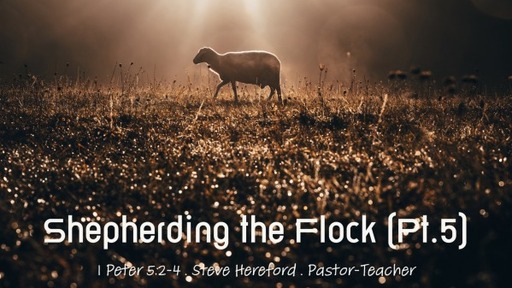Shepherding the Flock (Pt.5)

Peter commands the elders of the church to shepherd the flock of God. How is he to do that and what is involved ? Also, what does calling the church sheep have to do with this command? Join Pastor Steve as we answers these and many more questions in our study from 1 Peter 5:2-4.
This phrase broadly describes the functions of elders. The shepherd imagery suggests care, protection, discipline, and guidance (2:25 note).
It is not surprising, then, that Jesus likened the disoriented, confused, unclean, and spiritually lost crowds to flocks of sheep without shepherds (Matt. 9:36; Mark 6:34). They could not feed themselves spiritually and had no one to lead and protect them. The prophet Isaiah also compared humanity’s lost condition to that of stray sheep, “All of us like sheep have gone astray, each of us has turned to his own way” (Isa. 53:6).
Certainly Peter understood the imagery when he called believers the flock of God and commanded pastors to shepherd them. Since even believers are prone to wandering, taking in what is bad for them, becoming unclean, and are highly vulnerable, defenseless on their own, and often naive, the demand for shepherds who are faithful and responsible is compelling. And when the church is under severe persecution, as it was in Peter’s day, it is even more vulnerable and in greater need of strong, godly, effective shepherds.